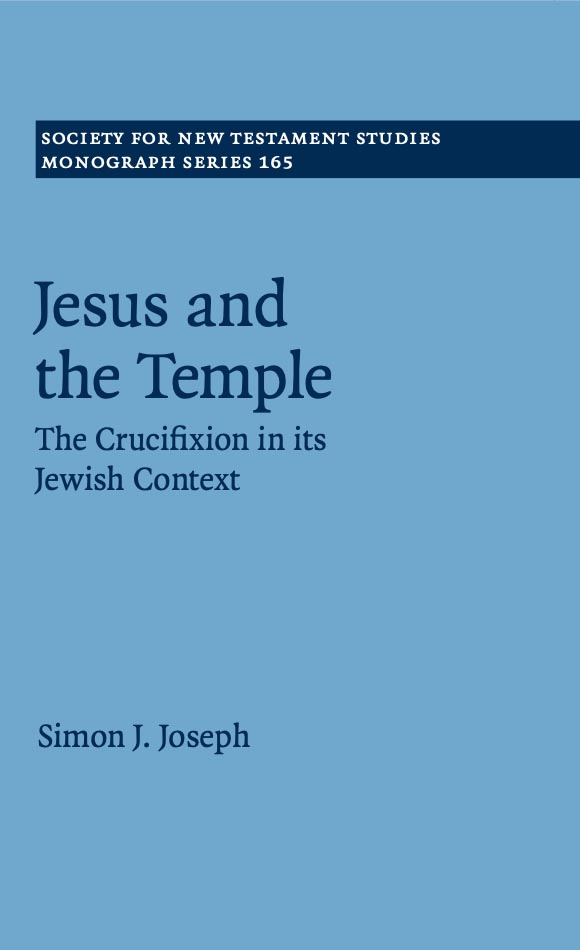Jesus and the Temple
(Cambridge University Press, 2016)
Jesus and the Temple – my third book, published within the Society for New Testament Studies monograph series – is a critical examination of the so-called “Temple Incident” described in the four Gospels of the New Testament.
Jesus and the Temple explores how the “Temple Incident” illustrates (and symbolizes) a central theme in the early Jesus tradition, namely the correlation between the destruction of the Temple and the identification of Jesus’s death as a sacrifice for the forgiveness of sins. For many historians, it also represents the most explanatorily powerful model of Jesus’s death.
By analyzing the “Temple Incident” through the lens of the comparative study of sacrifice in the ancient world – and taking seriously both the critical consensus on the theme of eschatological restoration in the teachings of Jesus and the historical record on “Jewish Christianity” – Jesus and the Temple proposes – and shows – that determining the historical Jesus’s attitude toward the Temple’s sacrificial system is far more complex than previously imagined.
After the publication of Jesus and the Temple in 2016, I was elected a member of the Studiorum Novi Testamenti Societas (SNTS). I was subsequently invited to discuss my work further in an article published in New Testament Studies. The title was “I Have Come to Abolish Sacrifices”: Re-examining a Jewish Christian Text and Tradition.”
One of the most intriguing discoveries about “Jewish Christians” in Late Antiquity is their pronounced vegetarianism, a topic I explored further in an article published for the Journal of the Jesus Movement in its Jewish Setting. This article was titled “Other Voices: Remembering the Marginalized Vegetarian in the Study of Christian Origins.”
In 2021, I revisited the theme of sacrifice in an article I published in the Journal of Biblical Literature. The article is titled ‘In the Days of His Flesh, He Offered Up Prayers’: Reimagining the Sacrifice(s) of Jesus in the Letter to the Hebrews.”
Reviews
“Joseph presents a radical Jesus, who had a more wide-ranging programme of reforming Jewish religion than simply that of calling people back to wholehearted obedience. The ideas presented in this study are likely to generate significant discussion.”
—Paul Foster
The Expository Times
“There is much to be commended in this book. Jesus and the Temple is a very readable and well-researched investigation into the circumstances of Jesus’s death. The argument is easy to follow, and Joseph’s analysis of both the primary and secondary literature is salutary. Even better, Joseph produces a consistent argument . . . an engaging read and one full of tantalizing possibilities. Joseph’s arguments deserve to be taken seriously by anyone interested in the study of the historical Jesus and the question of why he died.”
—Timothy Wardle
Journal of the Evangelical Theological Society
“Joseph demonstrates a remarkable knowledge of the scholarly material, and the erudition on display means that his study will undoubtedly serve as a core resource for all subsequent work on sacrificial imagery in the NT.”
—Grant Macaskill
Journal for the Study of the New Testament
“Joseph argues an intriguing and innovative thesis . . . Joseph’s thesis is cogently argued throughout . . . Joseph has performed a helpful service to scholarship in making this innovative and thoughtful proposal. Many will benefit from critically engaging with this volume.”
—David W. Chapman
Journal of Theological Studies
“Joseph’s contribution on sacrifice and the different Jewish/Jewish-Christian positions in the first century is illuminating … This provoking and thorough study contributes greatly to studies on the historical Jesus.”
—Ruben van Wingerden
JNTT Journal for Theology and the Study of Religion
“An insightful and original study about the historical context of Jesus’ death . . . comprehensive and convincing . . . an excellent scholarly work on the historical Jesus and an insightful resource for both undergraduate and graduate courses on the topic.”
—Yongbom Lee
Horizons: The Journal of the College Theology Society
